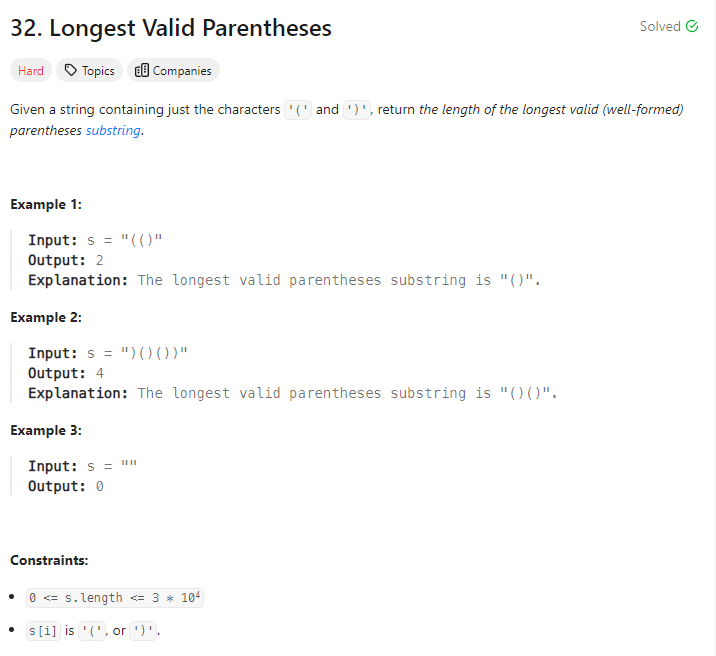Problem of The Day: Longest Valid Parentheses
Problem Statement
Intuition
The problem requires finding the length of the longest valid parentheses substring. A valid parentheses substring is one in which each open parenthesis '(' has a corresponding close parenthesis ')', and the parentheses are properly nested.
Approach
The brute-force approach uses a recursive function (dfs) to explore all possible combinations of parentheses substrings. The function keeps track of the number of open and close parentheses and updates the result when a valid substring is found.
Complexity
-
Time complexity: O(2^n) - Exponential time complexity due to the recursive exploration of all possible combinations.
-
Space complexity: O(n) - The depth of the recursion is proportional to the length of the input string.
This brute-force approach is not efficient and results in Time Limit Exceeded for larger inputs.
Brute Force - TIME LIMIT EXCEEDED
class Solution:
def longestValidParentheses(self, s: str) -> int:
N = len(s)
memo = defaultdict()
def dfs(i, open_count, close_count):
if close_count > open_count:
return
if i == N:
return
if s[i] == '(':
open_count += 1
else:
close_count += 1
if open_count == close_count:
dfs.result = max(dfs.result, open_count * 2)
dfs(i + 1, open_count, close_count)
dfs.result = 0
for i in range(N):
if s[i] == '(':
dfs(i, 0, 0)
return dfs.result
Improved Approach - Using Stack
To improve efficiency, we can use a stack-based approach. The stack helps keep track of the indices of unmatched parentheses, allowing us to calculate the length of valid substrings more efficiently.
Complexity
-
Time complexity: O(N) - Single pass through the input string.
-
Space complexity: O(N) - Stack can have at most N elements.
Stack-based Approach
class Solution:
def longestValidParentheses(self, s: str) -> int:
stack = [-1] # Initialize stack with a sentinel value -1
max_len = 0
# Iterate through the characters of the input string
for i in range(len(s)):
# If the current character is '(', push its index onto the stack
if s[i] == '(':
stack.append(i)
else:
# If the current character is ')', pop the top element from the stack
stack.pop()
if not stack:
# If the stack is empty after the pop, push the current index onto the stack
stack.append(i)
else:
# Calculate the length of the valid parentheses substring using the current index and the top element of the stack
max_len = max(max_len, i - stack[-1])
# Return the maximum length of the valid parentheses substring
return max_len
Editorial Code - Dynamic Programming Approach
Note: I need to review this approach again
class Solution:
def longestValidParentheses(self, s: str) -> int:
# Get the length of the input string
n = len(s)
# Initialize an array to store the length of valid parentheses substrings ending at each position
dp = [0] * n
# Variable to keep track of the maximum valid length
max_len = 0
# Iterate through the input string starting from the second character
for i in range(1, n):
# Check if the current character is ')'
if s[i] == ')':
# Case 1: If the previous character is '(', update dp[i] based on the length of the valid substring ending at i-2 (if i >= 2)
if s[i - 1] == '(':
dp[i] = dp[i - 2] + 2 if i >= 2 else 2
# Case 2: If the previous character is ')' and there is a valid substring ending at i-1, consider its length as well
elif i - dp[i - 1] > 0 and s[i - dp[i - 1] - 1] == '(':
dp[i] = dp[i - 1] + 2 + (dp[i - dp[i - 1] - 2] if i - dp[i - 1] >= 2 else 0)
# Update max_len with the current maximum length
max_len = max(max_len, dp[i])
# Return the final result, which is the maximum valid length
return max_len
Complexity Analysis
Time complexity: O(n). Single traversal of string to fill dp array is done. Space complexity: O(n). dp array of size n is used.
Editorial Code - Two pointer without extra space
This is the most optimized code for space efficiency Note: I need to review this approach again
class Solution:
def longestValidParentheses(self, s: str) -> int:
left, right = 0, 0
max_len = 0
# Left-to-right pass
for char in s:
if char == '(':
left += 1
elif char == ')':
right += 1
if left == right:
max_len = max(max_len, 2 * right)
elif right > left:
left, right = 0, 0
left, right = 0, 0
# Right-to-left pass
for char in reversed(s):
if char == '(':
left += 1
elif char == ')':
right += 1
if left == right:
max_len = max(max_len, 2 * left)
elif left > right:
left, right = 0, 0
return max_len
Complexity Analysis
Time complexity: O(n). Two traversals of the string.
Space complexity: O(1). Only two extra variables left and right are needed.
